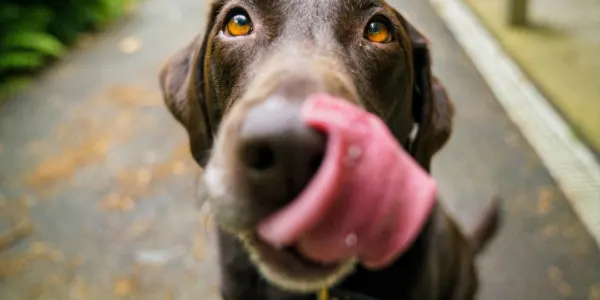Protect your pup’s teeth with these doggy dental care tips.
With over 75 million pet dogs in the United States, it’s no wonder that many owners consider their furry friends to be more like their own kids. But while plenty of kids prep for their dentist visit, you might not be able to remember the last time you had your pup’s teeth checked out.
Although dogs don’t develop as many cavities as humans do, you’ll still need to help out your pooch by attending to their teeth. Here are a few tips on doggy dental care that will allow you to keep your doggy dental care in check.

Learn How to Brush at Home
Yes, it is necessary to brush your dog’s teeth for them. Although the majority of dogs won’t enjoy the process (and some completely refuse to tolerate it at all), it’s an essential part of doggy dental care. Pet owners should at least attempt this task. Experts maintain that periodontal disease and other oral issues are highly prevalent and potentially avoidable in dogs. If untreated, oral neglect can lead to infection, pain, and more serious health conditions.
Vets say you should brush your dog’s teeth at least twice a week (although once a day is preferred) using a soft bristle brush and toothpaste made for pets. Some recommend that you should hold your dog’s snout and insert the toothbrush between the lips to reach the top and bottom teeth along the gum line. If your dog won’t permit you to brush their teeth no matter what you try, there are also plaque tooth wipes on the market that can do at least some of the work for you.
Focus on Food and Chews
There are edible ways to improve your dog’s oral health, as well. Dry food is better than wet food for dogs, as soft food will often stick to their teeth and cause decay. Dry food, on the other hand, can offer mechanical cleansing and may actually help to remove some of that dental buildup. Consider asking your vet about any special diets or best dog foods they might recommend improving your pup’s oral care.
Dental chews can also make a difference in doggy dental care. Purina recently launched a line of chews that are designed to freshen your dog’s breath, while Greenies are another popular option that’s been approved by the Veterinary Oral Health Council.
There are also other oral hygiene chews on the market that can supplement your brushing efforts. Just make sure that any chews or other treats you give your dog aren’t so hard that they’ll cause tooth damage.
For example, pigs’ ears and real bones can cause harm to your dog’s teeth or cause digestive issues, while tennis balls are well-known for the wear and tear, they can do to the enamel. Once again, your vet can be a great resource if you’re looking for brand or product recommendations.
Schedule Professional Cleaning and Care
Regardless of whether you’ve already made a habit of cleaning your pup’s teeth at home, your dog will likely need professional dental care at some point. Although 127.6 million U.S. adults visited a dentist in 2017, the vet will serve as your dog’s dental resource. When you take your dog to the vet every six months or each year, your veterinarian will do a preliminary examination of the teeth.
If any issues are found or suspected during that visit, your vet may recommend dental X-rays and a full examination, both of which will require your dog to be sedated. For older dogs or those with existing health issues, there may be a certain amount of risk involved with that. However, owners will have to consider that maintaining proper oral health is essential for longevity and overall well-being.
If your vet discovers any issues during the exam, a thorough dental cleaning will likely be recommended. Talk with your dentist about proper doggy dental care to find out a specific course of action for your pet and discuss how frequently your dog may need to undergo an examination and a cleaning.
Recognize the Warning Signs of Poor Doggy Dental Care
Ideally, your vet should be able to spot any suspicious signs of poor dental hygiene before it becomes a problem. However, owners need to be diligent and take action if they feel their dog’s oral care needs attention.
If you notice a change in your dog’s eating or chewing habits, excessive drooling, missing teeth, discoloration, swollen gums, tartar, mouth growths, pawing at the face, or ongoing bad breath, it’s definitely time to get your dog checked out.
Contact your vet as soon as possible if you observe any of these signs or if your dog hasn’t had an appointment in the last year.
Although doggy dental care isn’t exactly a walk in the park, owners have a duty to ensure their pups are healthy and cared for. Avoiding these issues now will certainly make things “ruff” later on, so it’s best to be proactive and bite the bullet. After all, prioritizing these tasks may allow your dog to live longer and provide companionship for many years to come.
